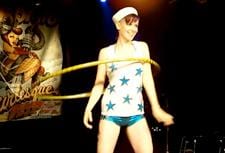At a time when the gay community is increasingly assimilating into mainstream society, it’s refreshing to meet youngsters who reject that tendency flat out.
“My work challenges queers as much as it challenges the hetero world,” says playwright/actor Evan Vipond. “There’s an increasing movement in our community towards heteronormativity, and younger queers are in a position to challenge that in a way that the rest of the community sometimes can’t.”
“When queer artists go mainstream, their queer identity can be muted or lost,” adds performance artist Olive-or-Oliver. “I want to tell people we don’t need to assimilate or prove ourselves to those who question our identities or how we express them.”
Vipond and Olive are part of the Young Creators’ Unit at Rhubarb, a facilitated workshop process that assists four youth in creating solo performances that are presented as part of the festival. Both were born female but identify as male and gender-queer respectively; both are intent on challenging stereotypes on all levels. Vipond’s piece, The Border, is a narrative play about a transman crossing into the US from Canada.
Olive has created Affirmation: A Sex Show In Six Movements, which combines monologue, drag and burlesque to explore shame, intimacy and queerness, with an explosion of sparkles and a whole lot of Saran Wrap.
Under the direction of facilitator Evalyn Perry, the group has met on a weekly basis since October to hash out their pieces. Though all of the works culminate in production at the festival, the youth start the project at different points in their process. While some have a mostly complete script they want to develop, others have only an idea they want to explore. Past participants include Mark Shyzer, Jonathan Schuster and Waawaate Fobister, whose show Agokwe swept the Dora Awards in 2009 and is currently touring across Canada.
The program provides both a way to develop practical creative skills and a space to explore ideas that might not fly elsewhere. “I’ve had a lot of ‘Holy Shit! How can I put this onstage!’ moments,” laughs Olive. “I don’t think there’s another space where I could explore subjects like self-objectification and intergenerational sex.”
Though neither artist is a stranger to Toronto stages (Vipond having appeared in the Paprika Festival and The Keith Cole Experience, and Olive at several burlesque events, including Strip Search 2010), the Young Creators’ Unit marks an important transition for both of them.
“This has been such an important stepping stone as I launch myself into being a professional artist,” Olive says. “It’s helped me realize I actually am an artist, and the work I want to make is valuable and important.”
“It’s been a great bridge between being a student and being a professional artist,” adds Vipond. “It’s given me the confidence to go forward creatively and helped me see my artistic work as having equal importance to my pay-the-bills job.”
Beyond having a space to explore their own voices and identities, both performers want to use the project as an opportunity to speak to the queer community from their own unique perspectives.
“It’s important for queer youth to have the opportunity to express themselves because their voices can be easily marginalized,” says Vipond. “Issues like gender-phobia and the oppression of women are just as prevalent in the queer community as the straight world, and so I want to use my work to address those things.”
“The piece I’m making is certainly edgy in terms of content and aesthetics, but I think there will be something in it that everyone can relate to,” adds Olive. “I’m hoping that people will walk away from it realizing it’s okay to love yourself in all your fabulous weirdness.”
Editor’s note, April 4, 2017: This article was corrected to accurately spell Olive-or-Oliver’s name and the abbreviation Olive.


 Why you can trust Xtra
Why you can trust Xtra


